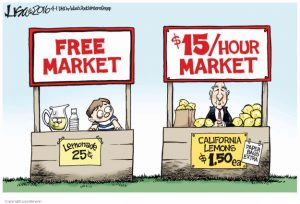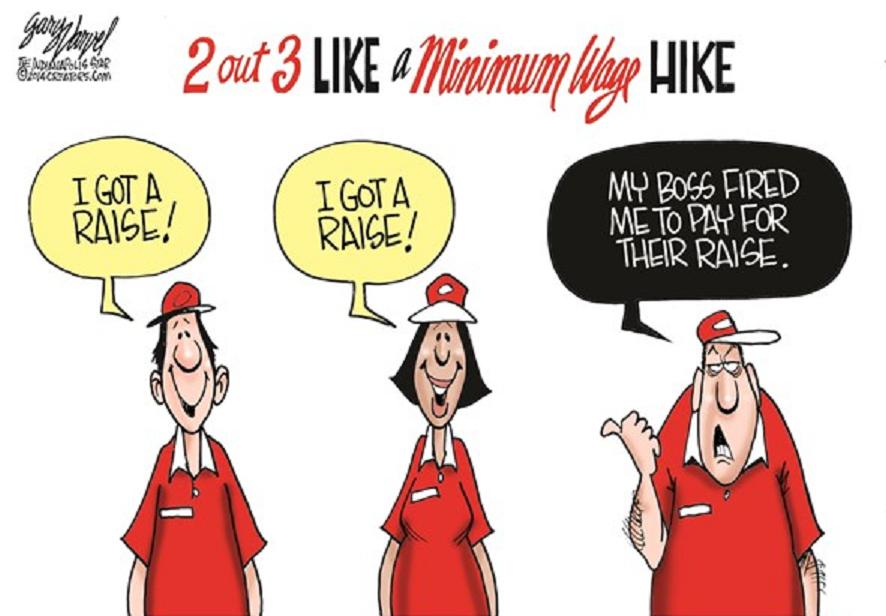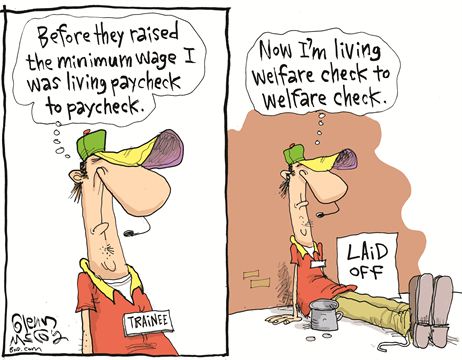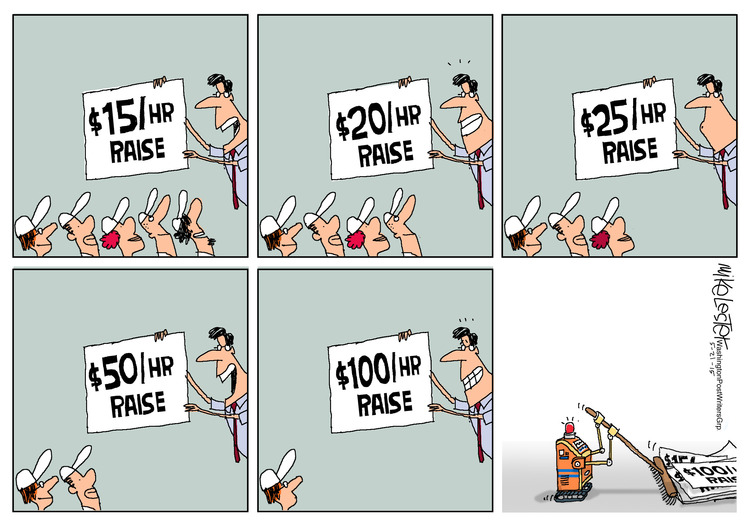 You would think that, given Baltimore Rising’s focus on jobs creation through all-inclusive economic growth that eliminates poverty, we would be huge fans of an increase in the minimum wage. Well, you’d be wrong.
You would think that, given Baltimore Rising’s focus on jobs creation through all-inclusive economic growth that eliminates poverty, we would be huge fans of an increase in the minimum wage. Well, you’d be wrong.
By state law, the minimum wage in Maryland is $8.25 per hour. On July 1, it’s rising to $8.75, then to $9.25 on July 1, 2017 and to $10.10 on July 1, 2018.
As you may know, Councilwoman Mary Pat Clarke has proposed an increase in the minimum wage in Baltimore to $15/hour by the year 2020. She means well, but it’s a bad idea. Here’s why…
For one thing, a higher minimum wage will, by definition, reduce the demand for low-cost labor. We’re talking about jobs that many low-skilled and unskilled Baltimore residents need to support themselves and their families.
What does “by definition” mean in this case? Well, think about it. At 40 hours/week, there are 2080 hours in a work year. Raise the minimum wage to $15/hour and you’ve just set the minimum annual income you can earn in Baltimore to $31,200.
So imagine walking into McDonald’s or the local pizzeria and saying to yourself, “Everyone here, whatever they do, is making at least $31,200.” At first, you like the sound of it, but then you realize, “Even the guy who is cleaning the tables and floors?” No disrespect meant to that employee. It’s honest, hard work, but is it really worth $31,200 per year, plus benefits? And how long is it going to take before the employees who were already earning $31,200 or more because they have the skills and experience to justify that income… How long is it going to take before they ask for more money?
More to the point, what would you do if you were the manager or owner of that business? Particularly if you’re a smaller business in a competitive market and can’t pass the higher costs of labor on to your customers? What are you going to do protect your profit margins?
You’re going to reduce your cost of labor by laying off or cutting the hours of your least essential employees – precisely the workers Ms. Clarke is trying to help. In the process, you’re going to cut hours for some of your employees to less than 30/week so that you don’t have to give them benefits. Problem: Those benefits have real monetary value. Loss of hours and benefits may actually negate the beneficial impact of the increase in the minimum wage. Management is doing precisely what it should. The problem is that the higher minimum wage program is off point.
$31,200 is significantly above the federal poverty line which, for a family of four, is $24,300. The poverty line is only $11,880 for a worker who is single, living alone. That worker – probably younger and let’s assume unskilled, high school educated worker with no dependents other than him or herself – is now making $31,200. That’s on a par with what many college graduates make when they first get out of school.
So, did we just eliminate poverty? Are the working poor no longer a thing to worry about? Of course not. If only it were that easy.
The minimum wage was born in 1938 during the administration of Franklin Roosevelt. It was $.25/hour. Twenty-two increases in the federal minimum wage later, it’s now $7.25/hour. According to the Dollar Times website, that first $.25 is now the equivalent of $4.10/hour. The point is, increases in the minimum wage have more than covered inflation. Even so, 22 increases in the minimum wage later, there’s still poverty. There are still hard-working people doing the best they can given their skills and experience and local economic conditions where they live, but who are still unable to make a living wage.
Most poverty is the result of long-term structural problems in local economies – in the economy of Baltimore – that can’t be corrected overnight by a simple adjustment, the results of which are likely to be counterproductive. No offence to Councilwoman Clarke and other well-meaning officials and voters who support raising the minimum wage, again and again. Unfortunately, her proposal is an example of government policy that misses the point.
Wouldn’t it be wonderful if you could eliminate poverty by raising the minimum wage? Why not just raise the minimum wage high enough to push everyone into the middle class and that would be that? But that’s absurd, isn’t it?
No. At best, you raise the minimum wage to protect people at the low-end of the economy from inflation – workers who don’t have the leverage with their employers to negotiate increases in what they are paid. But that’s, at best, a temporary solution to a relatively minor problem.
While it sounds like a good idea, a nice thing to do for people who aren’t making enough money, raising the minimum wage is no substitute for creating higher paying jobs and training your workforce to qualify for those positions. We’re not talking about jobs that require college educations or significant vocational programs. We’re talking about jobs for which motivated people can qualify in relatively short order. Jobs that will pay them living wages, and then some, because of the greater productivity these workers can provide to their employers.
You want more, higher paying jobs and to make sure people have the requisite skills, preferably by subsidized on-the-job training that assures the worker that he or she will be employed when the training in completed. Now that’s real, self-sustaining, long-term economic policy that Baltimore’s struggling families can take to the bank.
So vote against a higher minimum wage and for a government and job programs that will help Baltimore families earn more money for the right reasons – not just until the next increase in the minimum wage, but because we’ve helped them become long-term participants in strong and growing economy.


